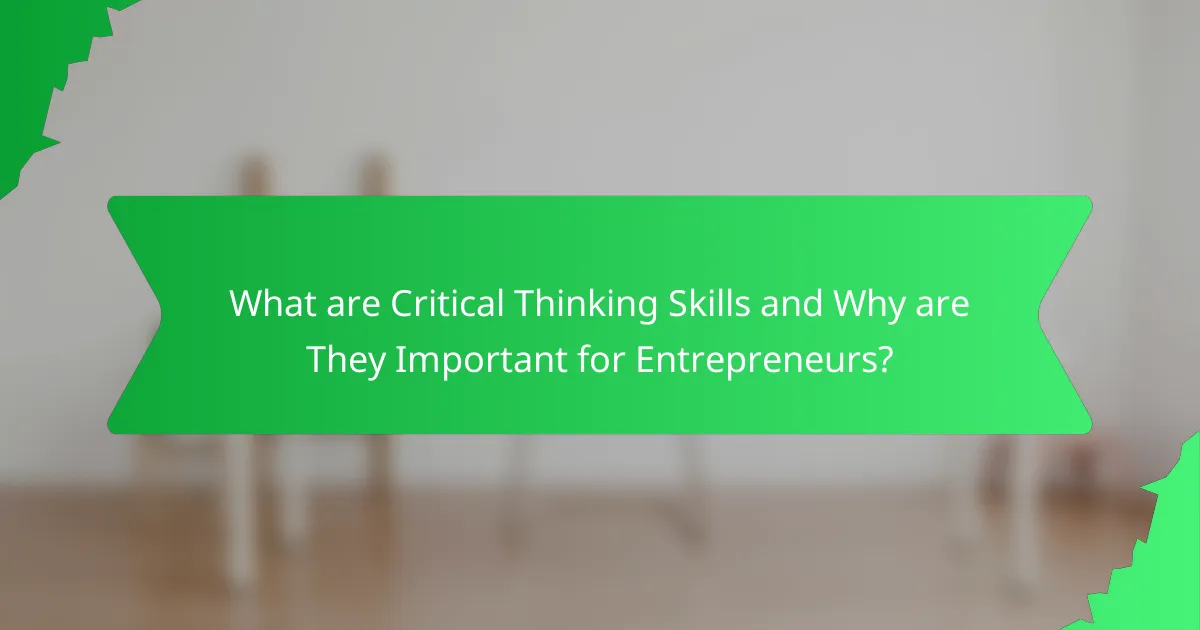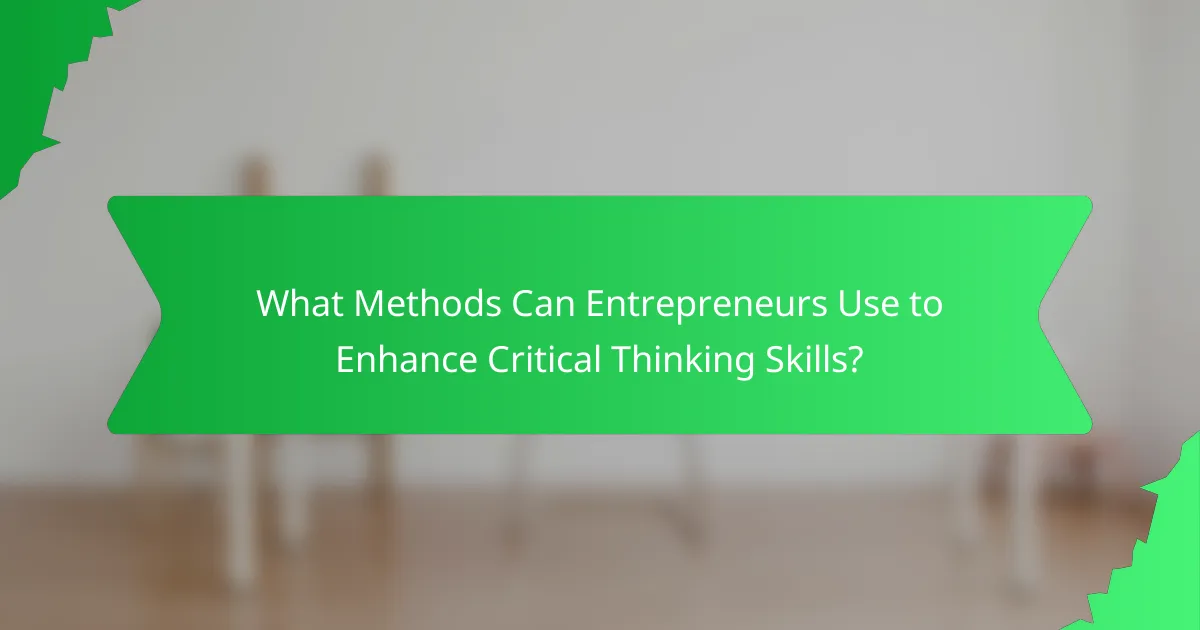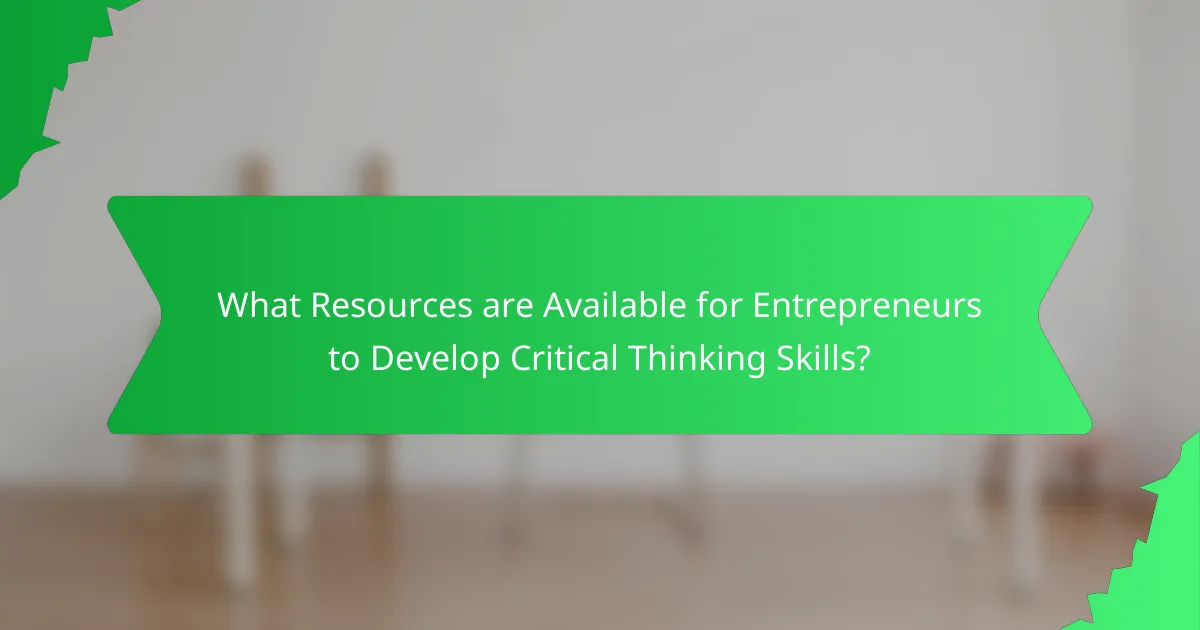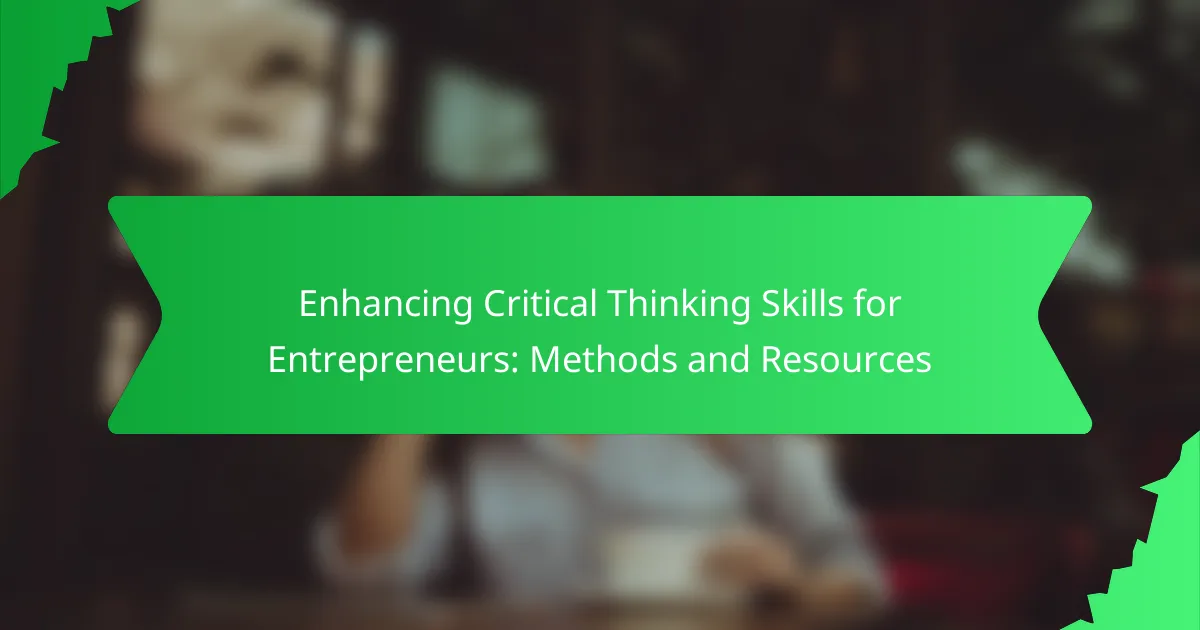Critical thinking skills are essential for entrepreneurs, enabling them to analyze information objectively, evaluate problems, and make informed decisions. This article explores methods for enhancing these skills, including reflective practice, brainstorming, seeking feedback, and engaging in problem-solving workshops. It also highlights various resources available for entrepreneurs, such as online courses, workshops, and books, which can further support the development of critical thinking abilities. By improving critical thinking, entrepreneurs can better assess risks and opportunities, ultimately contributing to their business success.

What are Critical Thinking Skills and Why are They Important for Entrepreneurs?
Critical thinking skills are the ability to analyze information objectively and make reasoned judgments. These skills enable entrepreneurs to evaluate problems, identify solutions, and make informed decisions. Strong critical thinking skills lead to better problem-solving and innovation. Entrepreneurs face complex challenges that require clear, logical reasoning. According to a report by the National Association of Colleges and Employers, critical thinking is among the top skills employers seek. This emphasizes its importance in the entrepreneurial landscape. Effective critical thinkers can also assess risks and opportunities, enhancing business success.
How do Critical Thinking Skills Impact Entrepreneurial Success?
Critical thinking skills significantly enhance entrepreneurial success. They enable entrepreneurs to analyze complex situations effectively. This analysis leads to better decision-making and problem-solving. Entrepreneurs with strong critical thinking skills can identify opportunities and risks more accurately. According to a study by the Harvard Business Review, effective decision-making is linked to critical thinking. The research indicates that companies with critical thinkers outperform their competitors. Furthermore, critical thinking fosters innovation. Entrepreneurs can evaluate ideas critically, leading to more viable business strategies. Ultimately, these skills contribute to sustainable growth and adaptability in a changing market.
What specific decisions can be improved through Critical Thinking?
Critical thinking can improve decisions related to problem-solving, strategic planning, and risk assessment. It enhances the ability to analyze complex situations. Entrepreneurs can make better financial decisions by evaluating data critically. This leads to more informed budgeting and investment choices. Critical thinking also aids in personnel management decisions. It allows for better hiring practices by assessing candidate qualifications thoroughly. Additionally, marketing strategies can be refined through critical analysis of consumer behavior. This results in targeted campaigns that resonate with the audience. Overall, critical thinking fosters a more analytical approach to decision-making in various business domains.
How does Critical Thinking contribute to problem-solving in business?
Critical thinking enhances problem-solving in business by enabling structured analysis and evaluation of situations. It helps identify root causes of issues rather than just symptoms. This approach ensures that solutions are effective and sustainable. Critical thinkers assess information critically, leading to informed decision-making. They can weigh different perspectives and anticipate potential consequences. Research indicates that companies fostering critical thinking see improved innovation and adaptability. A study by the American Management Association found that organizations with strong critical thinking skills are 40% more likely to achieve their goals. This underscores the importance of critical thinking in navigating complex business challenges.
What are the Key Components of Critical Thinking Skills?
The key components of critical thinking skills include analysis, evaluation, inference, explanation, and problem-solving. Analysis involves breaking down complex information into manageable parts. Evaluation refers to assessing the credibility and relevance of sources. Inference is the ability to draw logical conclusions from available evidence. Explanation entails clearly articulating reasoning behind conclusions. Problem-solving focuses on finding effective solutions to challenges. These components are essential for effective decision-making and innovation in entrepreneurship.
What cognitive processes are involved in Critical Thinking?
Critical thinking involves several cognitive processes. These include analysis, evaluation, inference, interpretation, and explanation. Analysis is the ability to break down complex information into manageable parts. Evaluation involves assessing the credibility and relevance of information sources. Inference is drawing logical conclusions from available data. Interpretation refers to understanding and clarifying meaning in information. Explanation is articulating reasoning and justifying conclusions. Each of these processes contributes to effective decision-making and problem-solving. Research indicates that engaging in these cognitive processes enhances critical thinking skills, which is essential for entrepreneurs.
How do emotional intelligence and critical thinking intersect?
Emotional intelligence and critical thinking intersect by enhancing decision-making and problem-solving abilities. Emotional intelligence involves recognizing and managing emotions in oneself and others. It aids in understanding the emotional context of situations. Critical thinking involves analyzing information and evaluating arguments logically. The combination allows individuals to assess emotional factors in decision-making. Research indicates that higher emotional intelligence leads to better critical thinking skills. A study by Brackett et al. (2019) found that emotional intelligence training improves critical thinking in educational settings. This connection is vital for entrepreneurs facing complex challenges.

What Methods Can Entrepreneurs Use to Enhance Critical Thinking Skills?
Entrepreneurs can enhance critical thinking skills through various methods. Engaging in reflective practice allows them to analyze their decisions and outcomes. Participating in brainstorming sessions encourages diverse perspectives and innovative solutions. Seeking feedback from peers helps identify blind spots and improve judgment. Reading widely across disciplines fosters a broader understanding of different viewpoints. Taking part in problem-solving workshops develops analytical skills through real-world scenarios. Utilizing critical thinking frameworks provides structured approaches to evaluate information. Lastly, practicing mindfulness can improve focus and clarity in decision-making. These methods collectively support the development of critical thinking abilities essential for entrepreneurial success.
How can entrepreneurs practice Critical Thinking in their daily routines?
Entrepreneurs can practice critical thinking in their daily routines by regularly questioning assumptions. This involves analyzing the reasoning behind their decisions. They should seek diverse perspectives to challenge their viewpoints. Engaging in reflective practice helps entrepreneurs evaluate their experiences. Setting aside time for problem-solving discussions fosters collaborative thinking. Utilizing tools like SWOT analysis can clarify strengths and weaknesses. Reading widely enhances knowledge and exposes them to new ideas. Finally, maintaining a growth mindset encourages continuous learning and adaptation.
What exercises can improve analytical thinking?
Exercises that can improve analytical thinking include puzzles, logic games, and problem-solving tasks. Engaging in puzzles like Sudoku or crosswords enhances pattern recognition. Logic games, such as chess, develop strategic thinking and foresight. Problem-solving tasks, including case studies, require critical evaluation of information. These activities encourage the analysis of data and decision-making processes. Research indicates that regular practice of these exercises can lead to improved cognitive skills. A study published in the journal “Intelligence” found that engaging in such activities enhances analytical abilities significantly over time.
How can entrepreneurs leverage feedback for better critical thinking?
Entrepreneurs can leverage feedback to enhance their critical thinking by actively seeking diverse perspectives. This process allows them to identify blind spots in their reasoning. Gathering feedback from customers, peers, and mentors provides insights into various viewpoints. Analyzing this feedback encourages entrepreneurs to reassess their assumptions and decisions.
Regularly reviewing feedback helps entrepreneurs refine their problem-solving strategies. It also fosters an environment of continuous learning. According to a study by the Harvard Business Review, feedback can significantly improve decision-making processes. Engaging with constructive criticism leads to better analytical skills. This ultimately results in more informed and strategic business choices.
What role does education play in developing Critical Thinking Skills?
Education plays a crucial role in developing critical thinking skills. It provides structured opportunities for students to engage in analytical reasoning. Through various teaching methods, such as Socratic questioning, students learn to evaluate arguments and identify biases. Education encourages collaborative learning, allowing students to discuss and challenge each other’s viewpoints. Research shows that students who participate in debate and discussion demonstrate higher critical thinking abilities. A study by Facione (2011) indicates that explicit instruction in critical thinking significantly improves students’ analytical skills. Therefore, education is essential for fostering the critical thinking necessary for effective problem-solving and decision-making.
Which courses or programs are most effective for entrepreneurs?
Entrepreneurs benefit most from courses that enhance critical thinking and practical business skills. Programs like the Stanford Graduate School of Business’ Executive Program in Strategy and Organization focus on strategic decision-making. The Harvard Business School Online’s CORe program teaches essential business concepts and analytical skills. Additionally, the Wharton School’s Entrepreneurship Specialization on Coursera offers insights into entrepreneurial finance and marketing. These programs are designed to cultivate analytical thinking and problem-solving abilities. Research shows that entrepreneurs with strong critical thinking skills are more likely to succeed in competitive markets.
How can mentorship enhance critical thinking abilities?
Mentorship enhances critical thinking abilities by providing guidance and feedback. Mentors challenge mentees to analyze situations from different perspectives. This process encourages deeper understanding and reflection. Regular discussions with mentors stimulate questioning and exploration of ideas. Studies show that mentorship fosters a safe environment for discussing complex problems. In this setting, mentees can practice decision-making skills. Consequently, they develop the ability to evaluate information critically. Research indicates that mentorship leads to improved problem-solving skills in various fields.

What Resources are Available for Entrepreneurs to Develop Critical Thinking Skills?
Resources available for entrepreneurs to develop critical thinking skills include online courses, workshops, and books. Online platforms like Coursera and Udemy offer courses specifically focused on critical thinking. Workshops conducted by organizations such as Toastmasters enhance public speaking and analytical skills. Books like “Thinking, Fast and Slow” by Daniel Kahneman provide insights into decision-making processes. Additionally, mentorship programs connect entrepreneurs with experienced professionals who can guide their critical thinking development. Engaging in networking events also fosters discussions that challenge perspectives and enhance analytical abilities. These resources collectively contribute to improving critical thinking among entrepreneurs.
What books and literature are recommended for enhancing Critical Thinking?
“Critical Thinking” is enhanced through specific literature. Recommended books include “Thinking, Fast and Slow” by Daniel Kahneman. This book explores the dual systems of thought and decision-making. “The Art of Thinking Clearly” by Rolf Dobelli offers cognitive biases and logical errors. “Critical Thinking: A Beginner’s Guide” by Sharon M. Kaye provides foundational concepts. “How to Read a Book” by Mortimer J. Adler focuses on analytical reading techniques. Each book is designed to develop reasoning and analytical skills. These resources are widely acknowledged in academic and professional circles.
Which online courses focus specifically on Critical Thinking for entrepreneurs?
Several online courses focus specifically on Critical Thinking for entrepreneurs. Courses such as “Critical Thinking for Entrepreneurs” on platforms like Coursera offer structured modules. These courses cover essential skills like problem-solving and decision-making. Another option is “Creative Problem Solving” available on edX, which enhances critical thinking through practical exercises. Additionally, LinkedIn Learning offers “Critical Thinking” courses tailored for business contexts. These courses are designed to help entrepreneurs improve their analytical skills and make informed decisions.
How can entrepreneurs utilize podcasts and videos to build Critical Thinking?
Entrepreneurs can utilize podcasts and videos to enhance critical thinking skills by engaging with diverse perspectives. Podcasts often feature expert interviews that present various viewpoints on complex issues. This exposure helps entrepreneurs analyze different arguments critically. Videos can illustrate real-world case studies, prompting entrepreneurs to evaluate outcomes and decision-making processes.
Listening to discussions on podcasts encourages active listening and reflection. Entrepreneurs can learn to question assumptions and develop their reasoning skills. Videos that challenge conventional wisdom can stimulate critical analysis. Engaging with interactive content, such as webinars, allows entrepreneurs to ask questions and participate in discussions.
Research indicates that multimedia learning can improve cognitive skills. A study by Mayer (2014) shows that incorporating various formats enhances understanding and retention. This evidence supports the effectiveness of podcasts and videos in promoting critical thinking among entrepreneurs.
What tools and technologies can support Critical Thinking development?
Digital platforms like online courses and educational software support critical thinking development. Tools such as Coursera and edX offer courses that enhance analytical skills. These platforms provide structured learning experiences. They often include interactive assignments and peer discussions. Mind mapping software like MindMeister helps visualize complex ideas. This visualization aids in organizing thoughts and exploring relationships. Simulation tools like Harvard Business Publishing simulations allow users to engage in real-world scenarios. These simulations encourage decision-making and problem-solving. Collaborative tools such as Google Workspace foster teamwork and diverse perspectives. These interactions enhance critical analysis through discussion and debate.
What apps are useful for practicing Critical Thinking skills?
Apps useful for practicing Critical Thinking skills include MindPal, Elevate, and Peak. MindPal offers puzzles and challenges that enhance logic and reasoning. Elevate focuses on cognitive skills through personalized training programs. Peak provides brain games designed to improve problem-solving abilities. Research indicates that regular use of such apps can boost critical thinking. For example, a study by the University of Cambridge found that cognitive training apps can enhance analytical skills in users.
How can collaborative platforms enhance group critical thinking?
Collaborative platforms enhance group critical thinking by facilitating diverse perspectives and real-time communication. These platforms allow team members to share ideas and challenge assumptions easily. This exchange fosters a deeper understanding of complex issues. Tools such as discussion boards and video conferencing promote active engagement. Research shows that collaborative environments can lead to better problem-solving outcomes. A study by Johnson & Johnson (1994) found that cooperative learning enhances critical thinking skills. This evidence supports the effectiveness of collaborative platforms in improving group critical thinking.
What are the best practices for sustaining Critical Thinking Skills over time?
Regular practice is essential for sustaining critical thinking skills over time. Engaging in debates sharpens analytical abilities. Reading diverse materials broadens perspectives and enhances understanding. Reflective journaling encourages self-assessment of thought processes. Collaborative discussions foster the exchange of ideas and challenge assumptions. Seeking feedback from peers promotes growth and refinement of reasoning. Continuous learning through courses or workshops keeps skills updated. Finally, applying critical thinking in real-life scenarios solidifies its relevance and effectiveness.
How can entrepreneurs regularly assess and improve their Critical Thinking skills?
Entrepreneurs can regularly assess and improve their critical thinking skills through structured methods. They can engage in reflective practices, such as journaling about decisions made and the reasoning behind them. This helps identify patterns in their thinking. Participating in discussions or debates enhances their ability to analyze different perspectives. Regularly seeking feedback from peers and mentors provides valuable insights into their thought processes. Entrepreneurs can also take online assessments to gauge their critical thinking abilities. Enrolling in workshops focused on problem-solving techniques fosters skill development. Lastly, reading literature on critical thinking provides theoretical frameworks that can be applied in real-world scenarios. These methods collectively enhance critical thinking skills, leading to better decision-making.
What common challenges do entrepreneurs face in maintaining Critical Thinking, and how can they overcome them?
Entrepreneurs face several challenges in maintaining critical thinking. Time constraints often limit their ability to reflect and analyze situations thoroughly. Stress and pressure from decision-making can cloud their judgment. Moreover, a lack of diverse perspectives may lead to narrow thinking.
To overcome these challenges, entrepreneurs can allocate specific time for reflection. Implementing structured decision-making frameworks can enhance clarity. Seeking feedback from diverse teams can provide fresh insights. Regular training in critical thinking techniques can also strengthen their skills.
Research shows that organizations promoting diverse viewpoints see improved problem-solving abilities. A study by the Harvard Business Review highlights the importance of varied perspectives in enhancing critical thinking.
The main entity of the article is critical thinking skills for entrepreneurs. This article provides a comprehensive overview of the importance of critical thinking in enhancing entrepreneurial success, detailing its impact on decision-making, problem-solving, and innovation. It outlines methods for developing these skills, including reflective practices, seeking feedback, and engaging in diverse learning opportunities. Additionally, the article highlights resources such as online courses and literature that can assist entrepreneurs in improving their critical thinking abilities, while addressing common challenges they face in maintaining these skills.
